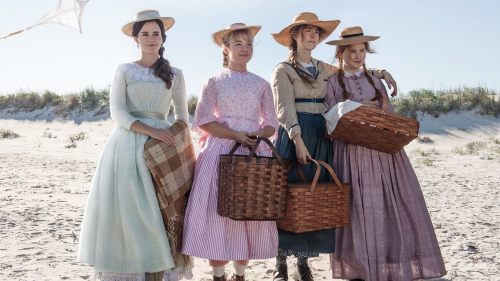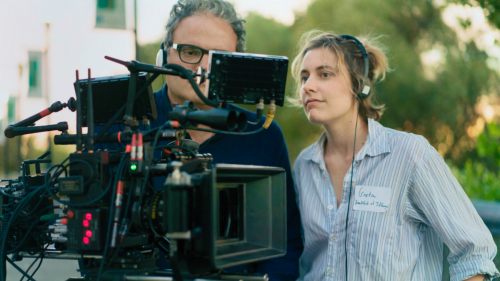NYFF Review: LADY BIRD – A Self-Portrait Of Selfish Youth
It’s hard to know exactly how much of her own story Greta Gerwig put in to Lady Bird, an oddball coming-of-age film that somehow doubles as, among several other seemingly immiscible elements, post-9/11 commentary. The details certainly line up; like Gerwig herself, Saorise Ronan’s Christine "Lady Bird" McPherson was born to a nurse and a computer programmer in Sacramento and attended Catholic School before escaping to college in New York. She’s even named after Gerwig’s mother, but whether the writer-director has stepped behind the camera to deliver self-critique at a distance or merely spin a tale out of thin air with bits of loving tribute (the truth is likely somewhere in between), it doesn’t seem to matter. The end result remains an affecting encapsulation of the joys, sorrows and narrow-mindedness of youth, painted with brush-strokes both harsh and tender.
Lady Bird opens with the eponymous character driving around with her mother (the incomparable Laurie Metcalf), and it tips its hand early. Before the film truly begins, Lady Bird lists off her problems and anxieties, from her need to escape her suffocating Sacramento suburb to her desire to move to the east coast. As she complains, her mother does what most mothers would when confronted with the problems of youth: she rightly puts them in to perspective. The world is bigger than Lady Bird. It changed drastically in the early 2000s in ways no one could predict, and people face problems far worse than hers every single day – but does that mean Lady Bird shouldn’t be invested in herself and in doing what’s best for her? That’s the tightrope the film walks, knowing full well that Ronan’s lead is self-absorbed – the film begins mere months after 9/11, making her decision to put on blinders all the more potent – but even so, it refuses to dismiss even her most frivolous-seeming concerns, whether they’re boys or friends or body image issues, no matter who has it worse.
The stories taking place around Lady Bird are far more interesting, and rooted in far more specific struggles. The film risks shooting itself in the foot by painting the narratives in its margins as more alluring, but Gerwig makes this setup work despite itself, throwing familiar elements of Americana and American high-school stories into a hilariously topsy-turvy mix (the specific cultural references may escape those of us that didn’t grow up there), but never forgetting to treat its characters with the seriousness and respect they deserve. Lady Bird’s mother is overbearing, but in the hopes having the kind of relationship with her daughter that her own abusive mother wasn’t capable of giving her. Her father (Tracy Letts) plays the “good” parent, going through life with a smile yet hiding the deep financial and personal insecurities that come with being an aged blue-collar worker in an economy dependant on evolution. Her adopted brother Miguel (Jordan Rodrigues) and his live-in girlfriend come off as pierced-and-tattooed intrusions in Lady Bird’s world of quirky artistic fantasy, but they too must deal with their own issues of small-town racism and domestic abuse respectively. Her best friend Julie (Beanie Feldstein) struggles with her weight and her social standing as Lady Bird complains about “feeling fat” in front of her. Her drama teacher comes off as buffoonishly emotional until we get a glimpse of the pain he carries, and finally her boy troubles with Lucas Hedges’ well-off, perfectly put together thespian Danny O'Neill don’t seem to have enough room for Danny’s own struggles with his sexual identity.
All the aforementioned problems have names. They can be pinpointed, and Lady Bird’s ignorance of them comes from a place of pure adolescent ego. And yet, her own feelings of inadequacy, of lacking love and attention even when she has it, of feeling trapped when there’s relatively little to be trapped by (well before her family’s financial situation is brought to her attention), none of these things can fully be expressed in words or singular scenes the way the supporting characters’ problems can. Even as she ignores the world collapsing around her, from new fears of global terrorism to America’s invasion of Iraq later in her Senior year (as pointed out to her by bad boy drummer Kyle, her last-ditch attempt at escaping the mundane, played by Timothée Chalamet), her self-centeredness feels totally familiar. It comes at the cost of the feelings of everyone around her, as she ditches old friends to fit in with a hip new crowd around whom she can’ be herself, beating with the kind of vague, abstract “universality” of experience a lesser film might’ve fumbled, centering the experience of a relatively normal, good-looking straight white girl in a world where queer kids and kids of colour and adults with bills to pay have it worse. It’s the kind of story we’ve seen far too often, centering the expansion of this character’s narrow worldview at the cost of people forced to exist in the margins, but Gerwig approaches it with the kind of thoughtfulness that makes even this meta-textual narrowness part of its thesis.
The narratives that Lady Bird spins are, understandably, centered around herself, and even when she finally learns to see the world outside her and the people she might’ve hurt, it might actually be too late. The lies she tells still continue to hurt, and the cost of her selfishness lingers even once she’s realized she’s the root of the problem when it comes to her mother’s unhappiness. As much as Lady Bird learning about her selfishness is centered in this narrative, very much at the cost of its queer and non-white and physically larger characters, the story isn’t about learning to be un-selfish. Rather, it’s about the cost of that selfishness in the first place – and yet, it takes an inside-out approach to that selfishness and to those youthful mistakes. It allows Lady Bird to get caught up in her bubble, screaming with joy during her first moment alone after her first kiss, even though the implications of that kiss are revealed to be different for Danny. Gerwig essentially says “I’ve been there. I know what it’s like” to all those whose simple joys and struggles with overwhelming, incomprehensible growing pains have immediate collateral damage.
That damage may remain, certainly alongside the hope that we can all move past it, but Lady Bird is the kind of bittersweet joy that reaches out and offers a sense of comfort in moments of regret. It’s about the things we did and the people we hurt fifteen years ago – and, to a degree, how ridiculous we all were on the precipice of adulthood. It’s about things we wish we could take back, but things we can’t because of the bigger picture outside of our own perspective. And it’s in recognizing the limitations of that perspective that we can begin to heal ourselves, and help others do the same.


